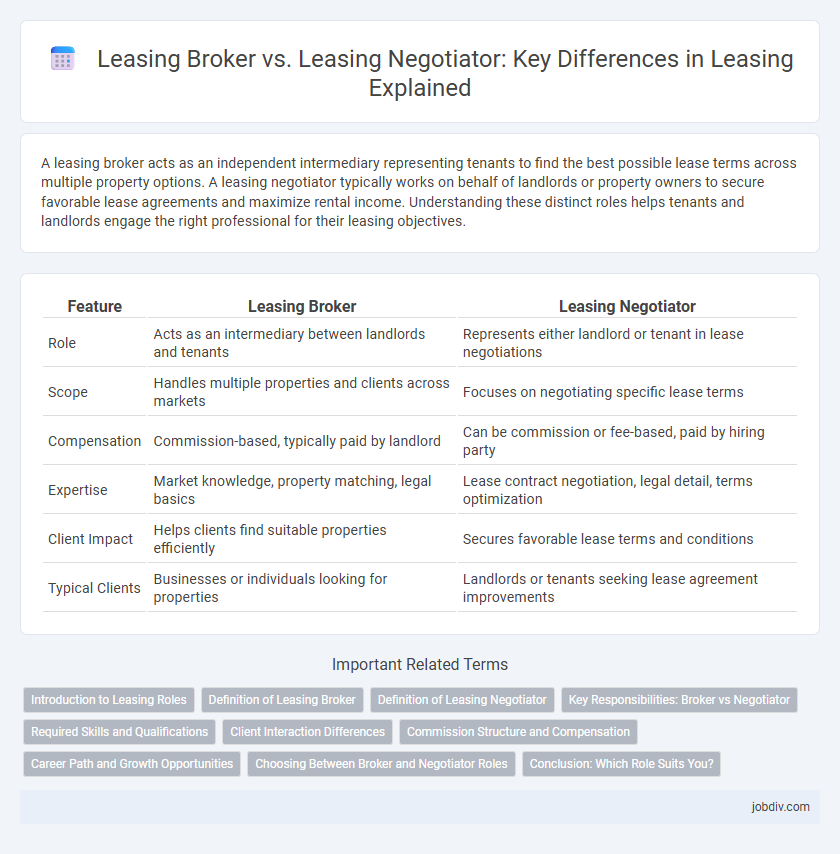A leasing broker acts as an independent intermediary representing tenants to find the best possible lease terms across multiple property options. A leasing negotiator typically works on behalf of landlords or property owners to secure favorable lease agreements and maximize rental income. Understanding these distinct roles helps tenants and landlords engage the right professional for their leasing objectives.
Table of Comparison
| Feature | Leasing Broker | Leasing Negotiator |
|---|---|---|
| Role | Acts as an intermediary between landlords and tenants | Represents either landlord or tenant in lease negotiations |
| Scope | Handles multiple properties and clients across markets | Focuses on negotiating specific lease terms |
| Compensation | Commission-based, typically paid by landlord | Can be commission or fee-based, paid by hiring party |
| Expertise | Market knowledge, property matching, legal basics | Lease contract negotiation, legal detail, terms optimization |
| Client Impact | Helps clients find suitable properties efficiently | Secures favorable lease terms and conditions |
| Typical Clients | Businesses or individuals looking for properties | Landlords or tenants seeking lease agreement improvements |
Introduction to Leasing Roles
Leasing brokers act as intermediaries connecting property owners with potential tenants, specializing in marketing and facilitating lease agreements across residential and commercial sectors. Leasing negotiators concentrate on representing landlords, skillfully negotiating lease terms, rent prices, and contract details to secure favorable outcomes for property owners. Both roles require comprehensive knowledge of real estate regulations, market trends, and client relationship management to optimize leasing transactions effectively.
Definition of Leasing Broker
A leasing broker is a licensed professional who acts as an intermediary between landlords and tenants, facilitating lease agreements and providing market expertise to secure favorable terms. Unlike leasing negotiators who often work directly for landlords to fill vacancies, leasing brokers represent the interests of both parties, offering a broader range of property options. Their services include conducting market analysis, negotiating lease conditions, and ensuring compliance with legal requirements to streamline the leasing process.
Definition of Leasing Negotiator
A leasing negotiator is a professional who facilitates discussions and agreements between landlords and tenants to secure favorable lease terms, often working directly for one party to represent their interests. Unlike leasing brokers, who may handle multiple clients and properties, leasing negotiators typically specialize in negotiating lease details such as rent, duration, and maintenance responsibilities to ensure mutually beneficial contracts. Their expertise in market analysis and contract law enables them to optimize leasing outcomes efficiently.
Key Responsibilities: Broker vs Negotiator
Leasing brokers primarily connect landlords with potential tenants, conducting market research, marketing properties, and facilitating lease agreements to secure optimal terms for both parties. Leasing negotiators focus on advising clients during lease discussions, analyzing contract details, and negotiating rental rates, lease durations, and terms to achieve favorable outcomes. Both roles require strong communication skills, but brokers emphasize client acquisition and property promotion, whereas negotiators specialize in contractual negotiations and deal structuring.
Required Skills and Qualifications
Leasing brokers require strong market knowledge, negotiation skills, and licensing credentials to legally represent multiple property owners and clients, often managing complex transactions. Leasing negotiators need excellent communication abilities, detailed understanding of lease agreements, and experience in client relationship management to effectively facilitate lease terms directly between tenants and landlords. Both roles demand proficiency in real estate regulations, analytical skills, and the ability to handle financial details critical to securing favorable leasing arrangements.
Client Interaction Differences
Leasing brokers manage client relationships independently, acting as intermediaries between tenants and landlords while providing personalized leasing options tailored to client needs. Leasing negotiators often work within agencies or property management teams, facilitating direct communication and negotiation on behalf of clients but with a more collaborative approach. Brokers typically offer broader market access and strategic advice, whereas negotiators emphasize detailed terms negotiation and client guidance during the contract finalization stage.
Commission Structure and Compensation
Leasing brokers typically earn commissions based on a percentage of the total lease value, incentivizing them to close high-value deals and often receiving payments from both landlords and tenants. Leasing negotiators usually receive a fixed salary or hourly wage supplemented by bonuses tied to lease signing or renewal milestones, focusing on client representation rather than deal volume. The commission structure for brokers promotes aggressive market outreach, while negotiators benefit from stable income aligned with client advocacy and lease terms optimization.
Career Path and Growth Opportunities
Leasing brokers typically enjoy broader career growth with opportunities to advance into senior brokerage roles, portfolio management, or business development, leveraging their extensive market network and negotiation skills. Leasing negotiators often start in entry-level positions focused on client interactions and deal facilitation, progressing toward specialized roles in contract negotiation or moving into leasing broker positions. Both career paths benefit from strong communication skills and market knowledge, but brokers generally have a more direct trajectory toward leadership and entrepreneurial ventures within the real estate leasing sector.
Choosing Between Broker and Negotiator Roles
Leasing brokers act as intermediaries connecting tenants and landlords, offering market insights and access to multiple properties, whereas leasing negotiators primarily focus on securing the best possible lease terms for a specific property on behalf of landlords or agents. Choosing between a leasing broker and negotiator depends on whether comprehensive market access or specialized lease negotiation expertise is prioritized. Understanding the scope of services, commission structures, and client goals is essential for selecting the most suitable role in the leasing process.
Conclusion: Which Role Suits You?
Choosing between a leasing broker and a leasing negotiator depends on your career goals and preferred work style. Leasing brokers typically benefit those who excel in networking and client acquisition, focusing on connecting tenants with properties for commission-based earnings. Leasing negotiators suit individuals who enjoy contract details and deal facilitation within property management teams, emphasizing negotiation skills over direct client sourcing.
Leasing Broker vs Leasing Negotiator Infographic

 jobdiv.com
jobdiv.com